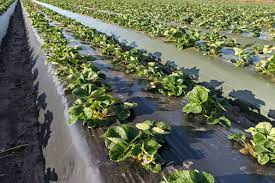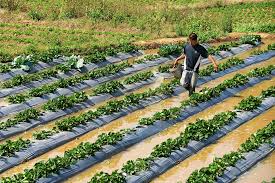
Organic farming mulching is a crucial technique in sustainable agriculture that involves applying natural or organic materials to the surface of soil. This method is widely embraced for its numerous benefits, both for the soil and the plants it supports. The practice of mulching in organic farming helps in retaining soil moisture, which is essential for maintaining consistent soil hydration and reducing the frequency of irrigation. By covering the soil with organic materials such as straw, leaves, grass clippings, or compost, the moisture that naturally evaporates from the soil surface is effectively reduced. This moisture retention is particularly valuable during dry periods, ensuring that plants have access to the water they need for optimal growth.

Additionally, organic farming mulching plays a significant role in suppressing weed growth. Weeds compete with crops for vital resources such as nutrients, water, and sunlight. By creating a physical barrier between the soil and the air, mulch prevents weed seeds from germinating and establishing themselves. This reduces the need for manual weeding or chemical herbicides, aligning with the principles of organic farming that prioritize natural and environmentally friendly practices. The presence of mulch also helps in controlling soil erosion, which can be a concern in areas prone to heavy rainfall or wind. Mulch acts as a protective layer that absorbs the impact of raindrops and reduces runoff, thereby preserving the topsoil and preventing nutrient loss.
Furthermore, organic farming mulching contributes to improving soil health and structure. As organic materials decompose over time, they add valuable nutrients and organic matter to the soil. This decomposition process enhances soil fertility and supports the growth of beneficial microorganisms that contribute to a healthy soil ecosystem. The increase in organic matter also improves soil texture, promoting better aeration and drainage. This results in a more robust root system for plants and enhances their overall resilience to environmental stressors.
Mulching in organic farming is also beneficial for temperature regulation. The mulch layer acts as an insulating barrier, helping to moderate soil temperatures by keeping the soil cooler during hot weather and warmer during colder periods. This temperature regulation helps in maintaining a stable environment for plant roots and supports consistent growth. By preventing soil temperature extremes, mulch helps to create a more favorable growing condition for crops throughout the growing season.
In addition to these practical benefits, organic farming mulching also has a positive impact on the broader ecosystem. Using organic materials for mulch reduces the need for synthetic inputs and minimizes the environmental footprint of farming practices. This aligns with the principles of organic agriculture, which emphasize the importance of working in harmony with natural processes and reducing reliance on artificial chemicals. Moreover, organic farming mulching can contribute to carbon sequestration. As organic materials decompose, they capture and store carbon in the soil, helping to mitigate the effects of climate change.
Overall, organic farming mulching is a versatile and valuable practice that supports sustainable agriculture in multiple ways. It enhances soil moisture retention, suppresses weed growth, improves soil health, regulates soil temperature, and reduces the environmental impact of farming. By incorporating organic mulching into their practices, farmers can foster healthier soils, increase crop yields, and promote ecological balance. This technique not only benefits the immediate agricultural environment but also contributes to the broader goal of creating a more sustainable and resilient food system. In summary, organic farming mulching is a key component of organic agriculture, providing a range of benefits that support both plant health and environmental sustainability.









